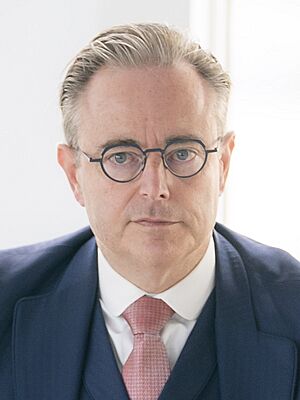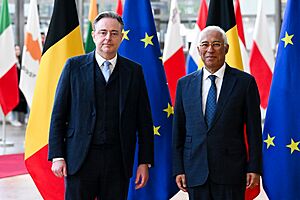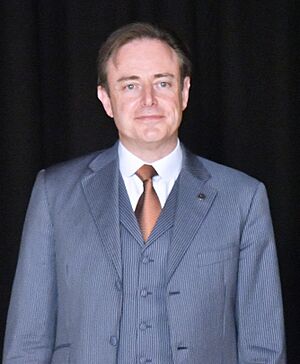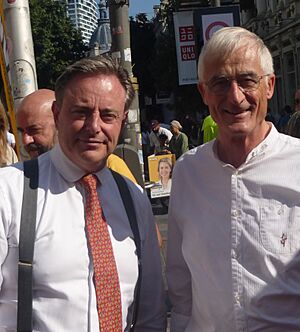Bart De Wever facts for kids
Quick facts for kids
Bart De Wever
|
|||||||||||||||||||||||||||||||||||||
|---|---|---|---|---|---|---|---|---|---|---|---|---|---|---|---|---|---|---|---|---|---|---|---|---|---|---|---|---|---|---|---|---|---|---|---|---|---|

De Wever in 2025
|
|||||||||||||||||||||||||||||||||||||
| Prime Minister of Belgium | |||||||||||||||||||||||||||||||||||||
| Assumed office 3 February 2025 |
|||||||||||||||||||||||||||||||||||||
| Monarch | Philippe | ||||||||||||||||||||||||||||||||||||
| Deputy |
See list
Jan Jambon
David Clarinval Maxime Prévot Frank Vandenbroucke Vincent Van Peteghem |
||||||||||||||||||||||||||||||||||||
| Preceded by | Alexander De Croo | ||||||||||||||||||||||||||||||||||||
| Mayor of Antwerp | |||||||||||||||||||||||||||||||||||||
| In office 1 January 2013 – 3 February 2025 |
|||||||||||||||||||||||||||||||||||||
| Preceded by | Patrick Janssens | ||||||||||||||||||||||||||||||||||||
| Succeeded by | Els van Doesburg (acting) | ||||||||||||||||||||||||||||||||||||
| President of the New Flemish Alliance | |||||||||||||||||||||||||||||||||||||
| In office 24 October 2004 – 3 February 2025 |
|||||||||||||||||||||||||||||||||||||
| Preceded by | Geert Bourgeois | ||||||||||||||||||||||||||||||||||||
| Succeeded by | Valerie Van Peel | ||||||||||||||||||||||||||||||||||||
|
|||||||||||||||||||||||||||||||||||||
| Personal details | |||||||||||||||||||||||||||||||||||||
| Born |
Bart Albert Liliane De Wever
21 December 1970 Mortsel, Belgium |
||||||||||||||||||||||||||||||||||||
| Political party | New Flemish Alliance | ||||||||||||||||||||||||||||||||||||
| Other political affiliations |
People's Union (until 2001) | ||||||||||||||||||||||||||||||||||||
| Spouse | Veerle Hegge | ||||||||||||||||||||||||||||||||||||
| Children | 4 | ||||||||||||||||||||||||||||||||||||
| Residence | Deurne, Belgium | ||||||||||||||||||||||||||||||||||||
| Alma mater | KU Leuven | ||||||||||||||||||||||||||||||||||||
| Signature | |||||||||||||||||||||||||||||||||||||
Bart De Wever, born on December 21, 1970, is a Belgian politician, historian, and author. Since February 2025, he has served as the Prime Minister of Belgium. Before becoming Prime Minister, he was the leader of the New Flemish Alliance (N-VA) party from 2004 to 2025. This party aims to change Belgium into a more independent system of states. From January 2013 to February 2025, he was also the Mayor of Antwerp, a major city in Belgium.
De Wever led his party to significant victories in several elections, starting with the 2010 federal elections. The N-VA became the largest party in Flanders and across Belgium. After the 2024 elections, King Philippe asked him to form a new government. After many months of discussions with other political parties, an agreement was reached on January 31, 2025. Bart De Wever officially became Prime Minister on February 3, 2025. He is the first Flemish nationalist politician to hold this important position in Belgium.
Contents
Early Life and Education
Growing Up in Belgium
Bart Albert Liliane De Wever was born on December 21, 1970, in Mortsel, Belgium. He grew up in Kontich, where his parents owned a small supermarket. His father had worked for a railway company and was involved in a local political group. Bart's older brother, Bruno De Wever, is a historian and professor. His grandfather was also involved in a Flemish political group during a challenging time in history. Bart De Wever has clarified his grandfather's role during that period.
School and University
De Wever first started studying law at the University of Antwerp. He later changed his studies to history at the Catholic University of Leuven (KUL), where he earned a master's degree. During his student years, he was part of student groups like the Liberal Flemish Students' Union and the Catholic Flemish Students' Union. He also worked as an editor for student newspapers. After finishing his studies, he helped research a new encyclopedia about the Flemish movement.
Starting a Political Career
Joining Politics
Bart De Wever began his political journey with the Volksunie (People's Union) party, which his father had also been a part of. He was elected as a local councilor in Berchem. When the Volksunie party faced different ideas among its members, De Wever joined a group that wanted the party to focus more on conservative and Flemish nationalist ideas. This group later helped create the New Flemish Alliance (N-VA) party.
Leading the N-VA Party
In 2004, Bart De Wever became the leader of the N-VA party. He was the only candidate and received strong support. Under his leadership, the N-VA became a more conservative party and gained more followers. In 2006, he faced some challenges when a politician named Jean-Marie Dedecker joined the N-VA, which caused some disagreements with another party. To fix this, Dedecker left the N-VA. Even with this difficulty, local N-VA leaders supported De Wever to continue as president.
In 2007, a photo showed De Wever at a conference in 1996 with a French politician, Jean-Marie Le Pen. De Wever explained that he attended to hear Le Pen speak, as he believed in freedom of expression. He stated that he wanted to hear different opinions directly, even if he disagreed with them. De Wever later said he found Le Pen to be a "showman" and had no ties to his party.
In October 2007, after the Mayor of Antwerp Patrick Janssens apologized for the city's role during World War II, Bart De Wever made comments about the difficult decisions leaders faced at that time. These comments caused some discussion. He later apologized to representatives of Antwerp's Jewish community and in a public letter, showing his respect and commitment to the community.
Elections and Government Formation
In the 2009 regional elections, the N-VA party did very well, winning 13% of the votes. They joined the regional government. De Wever chose to remain the party president and appointed other N-VA members to government roles. He also met with British Prime Ministers David Cameron and Boris Johnson.
In 2010, another election was held. The N-VA won the most votes in the Dutch-speaking parts of Belgium, and the Socialist Party won in the French-speaking parts. It took a very long time, 541 days, for the parties to agree on forming a new government. During this time, an interim government managed the country. The Di Rupo I Government was sworn in on December 6, 2011. The N-VA was not part of this new government. However, De Wever himself received a huge number of personal votes.
Becoming Mayor of Antwerp
In the 2012 local elections, Bart De Wever led the New Flemish Alliance to a big victory in the city of Antwerp. They won 37.7% of the votes, making him the new mayor.
Leading Antwerp as Mayor
First Term as Mayor (2013-2018)
Bart De Wever became the Mayor of Antwerp on January 1, 2013. This was a notable event, as it was the first time in many years that a non-socialist politician held this position. In December 2013, he received police protection due to a threat. In 2013 and 2014, he faced some health challenges, including severe anxiety and a lung infection, which required hospital stays.
National Elections in 2014
The N-VA party achieved its best result ever in the 2014 federal election. However, the leader of the Socialist Party, Elio Di Rupo, said his party would not work with De Wever and the N-VA to form a new federal government.
Re-election in 2018
In the 2018 local elections, the N-VA kept its strong position in Antwerp, winning 35.3% of the votes. This meant Bart De Wever continued as mayor for a second term.
Second Term as Mayor (2018-2025)
In 2019, Bart De Wever discussed how different cultures and beliefs interact in society. He talked about the importance of shared values and how some groups might express their faith in public spaces more than others. He also mentioned that he supports freedom of religion. Some politicians disagreed with his comments, but De Wever clarified that he was discussing integration challenges.
During the 2019 regional elections, the N-VA lost some votes compared to 2014. Despite this, De Wever remained the party president. His party did not join the national government formed in 2020, which was led by Alexander De Croo.
After the 2019 federal election, De Wever showed interest in creating a new political movement. He wanted to reduce the number of political parties in parliament, similar to how politics works in the United States and the United Kingdom. He hoped to attract voters from other parties like CD&V, Open VLD, and some Vlaams Belang supporters.
In November 2020, he was re-elected as the N-VA leader with a very high percentage of votes. This made him the longest-serving leader of a Belgian political party.
In March 2022, during a radio interview, he strongly criticized Russian President Vladimir Putin's actions in Ukraine.
Following the attacks in October 2023, Bart De Wever called for the Belgian Army to help protect Jewish sites in Antwerp. During a memorial event, he emphasized the importance of standing against violence and supporting democratic values. He stated that he was against terrorism and groups like Hamas. Some other politicians had different views, but De Wever maintained his stance against terror.
2024 Elections and Government Formation
In the 2024 federal and the regional election in Flanders, De Wever's N-VA became the largest party in the Chamber of Representatives. They also won a similar number of seats as the Vlaams Belang party in the Flemish Parliament. On July 10, the king appointed De Wever to form the next government. On January 31, 2025, an agreement was reached between the N-VA and several other parties. De Wever announced the agreement by posting a Latin phrase, Alea iacta est, which means "The die is cast," on social media.
Prime Minister of Belgium (2025–Present)
Taking Office
Bart De Wever was officially sworn in as Prime Minister on February 3, 2025. He is the first Flemish nationalist politician to hold this high office. His victory was seen by some as part of a trend of right-leaning governments in Western Europe. Despite his past support for Flemish independence, De Wever assured French-speaking voters that he would work with all parties in the government. He announced that his government would focus on improving welfare, reforming taxes, having stricter immigration rules, reducing European Union regulations, expanding nuclear power, and increasing Belgium's defense spending.
Policies at Home
In April 2025, De Wever announced the "Easter Agreement," which outlined future government policies. This agreement included plans to increase Belgium's defense budget, partly using taxes from frozen Russian assets. It also created a "Defence Fund" supported by state-owned companies. De Wever also stated that unemployment benefits would be limited to a maximum of two years, with some exceptions for students.
His government also pledged to have stricter rules on asylum and immigration. This includes rejecting asylum claims from migrants already registered in another EU country, tightening family migration laws, increasing the cost of applying for Belgian citizenship, and returning foreign criminals to their home countries.
International Relations

In February 2025, Prime Minister De Wever attended an EU security meeting. He confirmed that his government would continue to support Ukraine in the ongoing conflict and increase spending for NATO. He emphasized Belgium's duty to protect Western society. He also expressed concerns about Donald Trump's approach to Russia and Ukraine but affirmed strong ties with the US. He noted that Europe had not met its defense spending goals. In March 2025, De Wever disagreed with proposals to take frozen Russian assets, arguing it could be seen as an "act of war" and harm the global financial system.
On March 20, 2025, De Wever was invited by Dutch Prime Minister Dick Schoof to a meeting of "migration-realist" European leaders. This group of leaders aims to implement stricter immigration policies and influence EU decisions on asylum. They want tighter border controls and the creation of migrant "return centers" outside Europe.
Regarding an arrest warrant from the International Criminal Court for Benjamin Netanyahu, De Wever initially suggested Belgium might not uphold it. This caused disagreement among the governing parties. However, in May, the government decided to uphold the warrant, showing Belgium's commitment to international legal processes.
Political Ideas and Views
Views on Society and Government
Bart De Wever describes himself as a conservative and a Flemish nationalist. He admires the ideas of thinkers like Edmund Burke and has been influenced by writers such as Theodore Dalrymple and economists like Friedrich Hayek. He has also written articles and essays about society, which were published in a book called The Precious Fabric of Society in 2008.
Reuniting the Low Countries
In July 2021, De Wever suggested that a closer union between the Low Countries (Belgium and the Netherlands) could happen. He said he would be happier to be a "Southern Dutchman" than a Belgian. In June 2025, he repeated his support for the idea of Belgium and the Netherlands reuniting. He believes that the separation of these countries in the 16th century was a great misfortune.
Flemish Nationalism
As leader of the Flemish nationalist N-VA, De Wever supported the idea of Flanders gradually becoming more independent from Belgium. He imagined an independent Flanders within a larger democratic European group of sovereign states. In 2010, he said he was not trying to end Belgium immediately but believed the Belgian state was naturally changing. De Wever argued that French-speaking parties had blocked important reforms. He also felt that opposition to financial support from Flanders to Wallonia had increased Flemish nationalism. He believes an independent Flanders could manage its own taxes and business policies. He also thinks that people want to know "Where exactly do I belong?" in a globalized world.
De Wever has also supported the idea of a Greater Netherlands, where Flanders and the Netherlands could potentially unite or form a federal agreement. He believes that Dutch and Flemings are "the same people separated by the same language."
Economic Policies
De Wever sees the N-VA as the most economically liberal of the major Belgian parties. He emphasizes supporting businesses and opposes tax increases. He aims to reduce public spending, especially in social areas. De Wever has suggested limiting unemployment benefits, changing retirement pensions, raising the retirement age, and reducing the number of government workers. He also proposes giving more power over taxes and social security to the different regions.
As Prime Minister, De Wever said he would oppose too many rules from the European Union. He called for fewer EU regulations, arguing that too many rules slow down economic growth and innovation. He believes this would help Belgium and Europe compete better globally.
Views on Vlaams Belang
In Belgian politics, De Wever has discussed the "cordon sanitaire," which is an agreement among parties not to work with the Vlaams Belang (VB) party. He described this as undemocratic. He had previously criticized the VB's earlier version, the Vlaams Blok, saying its radical views harmed the image of the Flemish movement. However, after the 2019 Belgian federal election, De Wever considered breaking the cordon to include the VB as a possible partner. Although the N-VA held talks with the VB in 2019, they did not form an agreement.
In 2023, De Wever stated he would prefer to work with the VB than with the Workers' Party of Belgium, which he called "communists." He also said he had been hesitant to work with the Vlaams Belang due to the beliefs of some individuals in the party. However, he would form a Flemish nationalist government with the VB if it moved away from extremism. Later that year, De Wever partly stepped back from this idea, citing concerns about some party members.
How People See His Politics
Different people have different views on Bart De Wever's political style. Some describe him as skilled at discussing sensitive topics in a polite way. Others say he is not xenophobic or populist but has strong views on immigration. Experts have noted that he positions himself carefully, sometimes appearing as a popular leader who connects with many people, and other times as a more traditional politician. De Wever himself has said he is conservative and dislikes extreme politics. He has been described as a nationalist who focuses on shared values rather than ethnic background, and some wonder if he is still a separatist.
Personal Life
De Wever is married to a Dutch national, and they have four children. They live in Deurne. In 2012, De Wever went on a special diet and lost a significant amount of weight. His physical change was noticed by the Belgian media, and he later published a book offering advice on weight loss. Outside of politics, De Wever enjoys marathon running. Besides Dutch, he also speaks French, English, and German.
Images for kids
See also
 In Spanish: Bart De Wever para niños
In Spanish: Bart De Wever para niños
 | Leon Lynch |
 | Milton P. Webster |
 | Ferdinand Smith |




